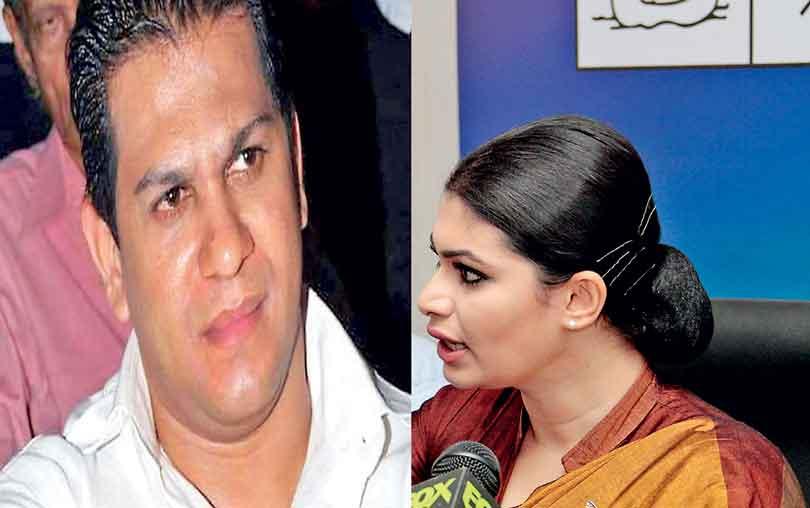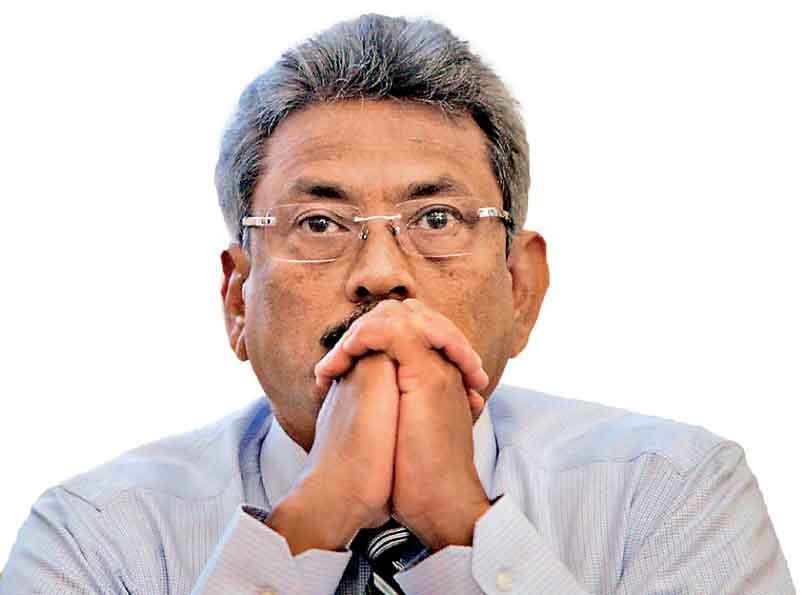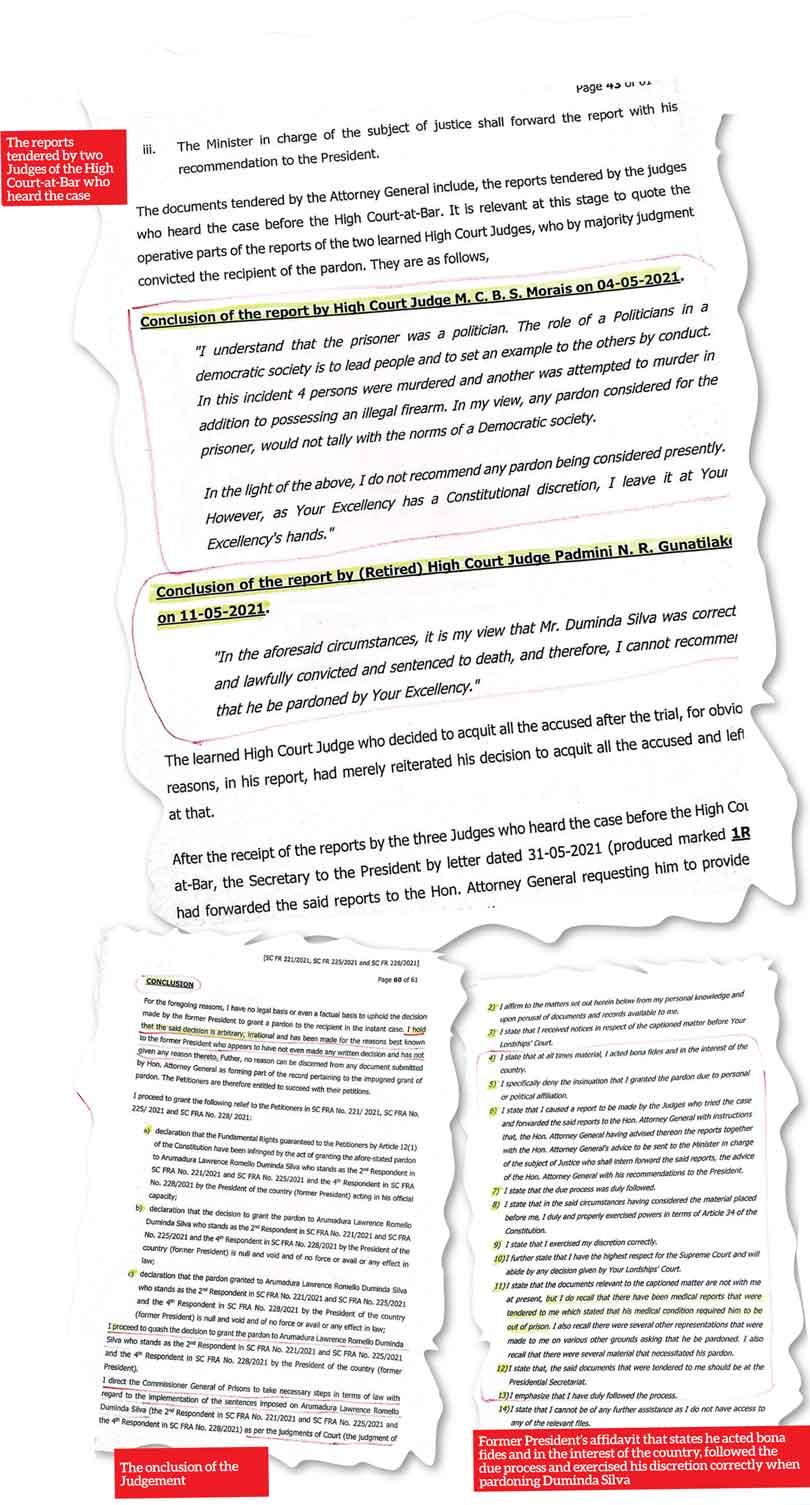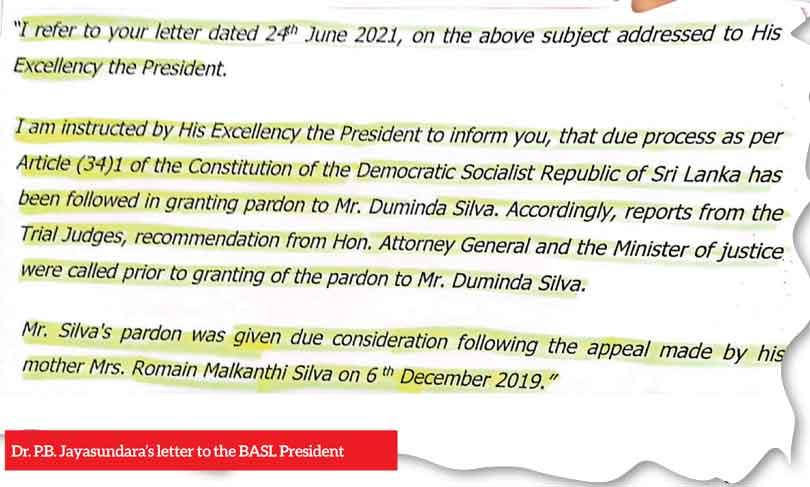27 Feb 2024 - {{hitsCtrl.values.hits}}

Duminda Silva Hirunika Premachandra

Former President Gotabaya Rajapaksa


 It has now come to light how former President Gotabaya Rajapaksa acted arbitrary and unreasonably for reasons best known to him when granting pardon to former parliamentarian Duminda Silva in 2021.
It has now come to light how former President Gotabaya Rajapaksa acted arbitrary and unreasonably for reasons best known to him when granting pardon to former parliamentarian Duminda Silva in 2021.
Although the recent Supreme Court (SC) Judgement that quashed Silva’s pardon reveals this, the former President by an affidavit dated February 3, 2023, has informed the Apex Court that he followed the due process and exercised powers duly and properly in terms of Article 34 of the Constitution and implemented his discretion correctly when granting pardon to Silva.
The three bench that quashed Silva’s pardon on January 17, 2024 comprised Justices P. Padman Surasena, E.A.G.R. Amarasekera and Arjuna Obeyesekere.
President’s Counsel M.A. Sumanthiran with Suren Fernando, Niranjan Arulpragasam and Khyati Wickramanayake appeared for the Petitioner Hirunika Premachandra in SC FRA 221/21.
Sumana Premachandra (SC FR 225/21) and former member of the Human Rights Commission Attorney at Law Ghasali Hussain (SC FR 228/21) too filed two separate FR Applications.
Appearing for Rajapaksa, Manohara de Silva PC, in his submissions, stated that the SC should not exercise its powers and review the pardon granted by the President to which both Gamini Marapana PC and Anuja Premaratne PC- who appeared for Duminda Silva in case No: SC FR 221/21 and228/21- respectively took the similar position on the review ability of the pardon granted.
However, the three member bench held that the grant of a pardon to an offender by the President is reviewable by the SC in terms of its jurisdiction under Article 126 of the constitution.
All the counsels, who appeared for the three petitioners, stated that Rajapaksa infringed the FR guaranteed to each citizen, in terms of Article 12 of the Constitution, when he chose to grant the pardon only to Silva ignoring the other three convicted by the Trial-at Bar which was affirmed by the SC.
“The President of the country should treat all prisoners equally. A treatment that’s not equal cannot be expected from the Head of the State when there are many convicts with severe sicknesses on death row,” a leading legal luminary said on condition of anonymity.
The Counsels for the Petitioners further said that Rajapaksa had completely ignored the provisions in Article 35 of the Constitution and has acted arbitrarily and outside the powers given to him by the constitution;the decision taken by him is irrational, unreasonable and cannot be supported by any reason;has failed to give any reason whatsoever to justify his decision and has completely ignored the provisions in Section 3(q)of the Assistance to and protection of Victims of Crime and Witnesses Protection Act No. 4 of 2015 as amended; had made a biased decision when he chose to grant the pardon who is one of his close friends and a political ally and the pardon granted erodes the confidence the public has reposed in the criminal justice system of the country.
When the appeal was taken up by the SC, by an interim order, directed the Attorney General (1A Respondent), Minister of Justice Ali Sabry PC (3rdRespondent) and the 4th Respondent President Bar Association of Sri Lanka (BASL) Saliya Peiris PC, to submit all relevant documentation pertaining to the pardon including the communications sent by the President and the recommendations the latter received.
The other documents that were expected to be submitted to Court were- any petition for release/ pardon submitted on behalf of Silva; the report/s if any caused to be made to the President by the Hon. Judges who heard the case initially; the advice of the AG and the documentation that was forwarded to Minister of Justice; the recommendations made by the Minister of Justice which was submitted to the President along with any other documentation;correspondence between the BASL and the President on the subject matter and a true copy of the Gazette, proclamation or document containing the decision in granting pardon.
But the AG by his motion dated July 28, 2022, has submitted only the following documents-the request made by Duminda Silva’s mother; the request made by 117 MPs; Secretary to the President’s letter to the AG; the reports of the Judges of the Trial-at-Bar; the advice of the AG to the Minister of Justice and President’s Secretary Dr. P.B. Jayasundera’s letter to the President of the BASL.
Although the court expected the relevant respondents to submit the record pertaining to the pardon - a copy of the gazette, proclamation or document containing the decision, neither the AG nor any other Respondent submitted the said document.
The only document which indicates that such a pardon has been granted was Dr. Jayasundera’s letter to the President BASL dated July 5, 2021.
Dr. Jayasundera’s letter to the President BASL states, ‘I refer to your letter dated June 24, 2021, on the above subject addressed to the President.
‘I am instructed by the President to inform you that due process as per article 34 (1) of the Constitution has been followed in granting pardon to Mr. Duminda Silva. Accordingly, reports from the Trial Judges, recommendation from the AG and the Minister of Justice were called prior to granting of the pardon.
‘Mr. Silva’s pardon was given due consideration following the appeal made by his mother Mrs. Romain Malkanthi Silva on December 6, 2019’.
In Dr. Jayasundera’s letter, it is clear that it has been written after the conclusion of granting the pardon. By this letter he has neither divulged as to when the pardon was granted nor given the reason why it was granted.
Further to the affidavit submitted by Rajapaksa, it states that he called reports from the Judges of the Trial-at-Bar and forwarded them to the AG. These reports and the AG’s advice had been then sent to the Minister of Justice. Later he had obtained the Minister’s recommendations together with the said reports and AG’s advice.
The affidavit further states, ‘Having considered the material placed before me, I duly and properly exercised powers in terms of Article 34 of the Constitution. I state that I acted bona fides in the interest of the country; I state that the documents relevant to the captioned matter are not with me at present, but I do recall that there have been medical reports that were tendered to me which stated that his medical condition required him to be out of prison. I also recall there were several other representations that were made to me on various other grounds asking that he be pardoned. I also recall that there were several material that necessitated his pardon’.
“What is the interest of the country he had taken into consideration?None of the documents the AG has submitted has ever indicated that the granting of the pardon was based on such a reason- interest of the country,” the sources said.
As per the Judgement, this position taken by the former President is not supported either by himself or by the other documentation before the court. Therefor it is unable to accept that the President had acted in the interest of the country when he decided to grant the pardon. Apart from the reports of the Judges at the High Court-at- Bar, the advice of the AG to the Minister and the recommendation of the Minister, there are only two other documents submitted to courts which could be regarded as material placed before the President for his decision. Those two documents contain the requests made by Silva’s mother and 117 Members of Parliament to grant pardon Silva. Although the President has stated that he recalls that there are several other representations made to him to pardon Silva, the court has not found any such material other than the said two letters.
When reports were called from the Judges of the High Court-at-Bar, M.C.B.S. Morais in his report dated May 4, 2021, has stated, ‘I understand that the prisoner was a politician. The role of a politician in a democratic society is to lead people and to set an example to the others by conduct. In this incident, four persons were murdered and there was attempted murder on another in addition to the possessing an illegal firearm. In my view any pardon considered for the prisoner would not tally with the norms of a democratic society.
‘In the light of the above, I do not recommend any pardon being considered presently. However, as your Excellency has a constitutional discretion I leave it in your Excellency’s hands’.
High Court Judge Morias in his report, submitted under Article 34 of the Constitution with regard to the prisoner, opined that in considering a pardon the President may consider whether the objectives of granting a pardon was achieved and the extent of such an achievement. He noted that if the sentence is converted to years of imprisonment, it would be equivalent to 132 years of imprisonment and the prisoner has so far approximately served only 4 years and 8 months of the term.
High Court Judge Padmini N.R. Gunathilake in her report dated May 11, 2021, has stated, ‘In the aforesaid circumstances, it is my view, that Duminda Silva was correctly and lawfully convicted and sentenced to death and therefore I cannot recommend that he be pardoned by Your Excellency’.
As per the Judgement, High Court Judge Shiran Gooneratne who decided to acquit all the accused for obvious reasons, in his report to the President’s Secretary had merely reiterated his decision to acquit all the accused and left it at that.
After the receipt of the reports from the three Judges, President’s Secretary had forwarded them to the AG requesting him to provide his advice on the matter to the Minister of Justice.
Minister advised on proper legal position
The AG by letter dated June 21, 2021, had clearly advised the Minister on the proper legal position with regard to the decision-making process by the President. The AG has advised the Minister that the power of pardon, remission can be exercised upon discovery of an evident mistake in the judgement or undue harshness in the punishment imposed.
He has further underscored the counts upon which the recipient of the pardon was convicted on four charges of murder; one count of attempted murder and two charges of criminal intimidation.
Having considered the AG’s advice, the Minister of Justice has written back to the President not making any positive recommendation to grant the pardon. But questions have been raised whether the Minister considered and acted on the given advisesby the AG.
Meanwhile, PC Sumanthiran, referring to the letter submitted to court that the assertion by the Justice Minister, that ‘Justice Shiran Gooneratne in a communication to the President’s Secretary has expressed the view that all accused in this case should be acquitted of all counts on the indictment’ is false.
In the judgement it says, ‘Thus, I observe that High Court Judge Gooneratne in his report had not expressed the view that all accused in this case should be acquitted of all counts on the indictment. What was stated in his communication to the Secretary to the President is the fact that he had acquitted all the accused from all counts in the indictment for the reasons he had set out in his judgement. Therefore, other than repeating the effect of his judgement, which was by that time well-known to everyone concerned, High Court Judge Gooneratne had not expressed any fresh view on the matter. He is also silent about any recommendation to the President is not supported by the contents of the report made by Justice Gooneratne.
The question arises as to which official recommended to the President that the pardon should be granted. The answer is that no such stakeholder had ever recommended to the President that this offender had to be granted a pardon.
The AG has made it clear that the pardon is not a private act of grace from an individual possessing power, but is a part of the constitutional scheme. The Minister had merely reproduced only a part of the advice provided to him by the AG.
The former President hasn’t followed due process when granting the pardon; had opted not to adhere to the AG’s advice; had not at all considered what the law has required him to consider and is unable to hold that Rajapaksa had exercised his discretion correctly.
In the judgement, it says ‘This court has constantly held that the President is not only bound by law, but it is also the duty of him to uphold the law of the country which is set out in Article 33(h) of the constitution.. The sovereignty is vested in the people of this country and not in the President of the country.
‘When taking into consideration the resources used by the State to administer justice in this case as demonstrated above, there is neither a decision nor any reason for the granting of the pardon; I have to accept the petitioners argument that the instant grant of pardon to the recipient by the President has totally eroded the confidence the public has reposed in the criminal justice system of the country.
In the two letters that were sent to the former President requesting to grant permission to Silva, one of the request for a pardon was based on the fact the recipient of pardon had suffered head injuries due to gunshot.
The judgement states, ‘I have to hold the argument that the former President had decided to grant the pardon to the recipient as he had suffered head injuries. It is relevant to note here that it is the Minister of Justice who would have been in a better position to ascertain the correct position regarding the health/treatment conditions of the recipient of the pardon since the prison come under the direct purview of the Ministry. The Minister in his report had not recommended that a pardon be granted to the recipient on such basis.
If the recipient of the pardon stands wrongly convicted as claimed because one of the High Court Judges in the Trial-at-Bar was bias, it is needless to say, that all others accused in this case also stand on similar circumstances. The question then arises as to why the former President picked on just one accused, namely the recipient of the pardon out of many accused to grant a pardon on that basis. Does such a move stand the test of rationality, reasonableness, intelligibility and objectively. The answer clearly is no. Such a move adopted by the former President would be more indicative of an arbitrary action rather than an objective decision’.
Concluding the hearing, the Bench declared that the decision to grant a pardon to the recipient is arbitrary, irrational and has been made for the reasons best known to the former President who appears to have not even made any written decision and has not given any reason thereto.
The judgement further states, ‘I proceed to quash the decision to grant the pardon to Duminda Silva by the President of the country. I direct the Commissioner General of Prisons to take necessary steps in terms of law to implement the sentence imposed on Silva as per the Judgements of High Court of Colombo (HC Colombo/ TAB 7781/2015/06) read with the Judgement of the SC in case No. SC/TAB/2A-D/2017)’.
Sri Jayawardenepura Hospital refused to transfer Duminda
Meanwhile Prison Spokesman Gamini Dissanayake said that all their efforts taken to get Silva transferred to the Prison Hospital from Sri Jayawardenepura General Hospital from the time he was arrested with the interim order failed because the Jayawardenepura Hospital authorities refused to transfer him claiming that his condition was serious and that the prison hospital does not have the facility to treat Silva.
“There are sicknesses to inmates that the prison hospital cannot treat and with the medical officer’s recommendation we transfer such prisoners to the National Hospital Colombo as it is the only hospital that has all necessary facilities to treat patients, but not any other hospital in the country.
According to the Prison Spokesman, Silva has to be supplied with oxygen when he gets the fit and a Consultant Physician that visit the prison hospital checks on his condition and prescribes medicine if needed. He further said that they had to furnish a report to the SC about the Jayawardenepura hospital and getting Silva back into the prison.
“No sooner he was brought to the prison, he complained of a breathing difficulty and was admitted to the prison hospital,” she said.
Meanwhile, trade union officers at the National Housing Development Authority (NHDA)- where Silva worked as the Chairman from June 2021 up to the time he was arrested- said that he had not shown any sign of sickness when working with them, but from the moment the interim order was issued he was hospitalised for a medical condition employees at the NHDA was not aware of.
02 May 2024 6 hours ago
02 May 2024 7 hours ago
02 May 2024 7 hours ago
02 May 2024 8 hours ago
02 May 2024 9 hours ago